
- TOEFL Materials
- DUOLINGO Materials
- TOEFL Articles
- DUOLINGO Articles


Sample Essays for the Writing Section of the TOEFL® Test
Did you hear about the updated TOEFL iBT Writing section?
On July 26, 2023, ETS introduced a new TOEFL Writing question : Writing for an Academic Discussion.
That’s right. The Independent Writing question has been retired from the official TOEFL iBT test.
Before we get into the topics and sample essays for the new TOEFL Writing question, let’s start with the first task, which hasn’t changed, the Integrated Writing.
TOEFL Integrated Writing Topics
In the TOEFL Writing Section, there are two questions you must respond to. The first question is called the TOEFL Integrated Writing task. The second question is called the TOEFL Writing for an Academic Discussion task.
The integrated question presents a reading and listening passage, followed by a question, which is a bit more complicated.
Simple, right?
No? Still confused.
No worries. The best way to understand something better is through examples.
Let’s do one together.
This TOEFL integrated writing topic deals with the use of Corn Ethanol.
Give yourself three minutes to read it:
The chemical compound, ethanol, has risen in recent years as the most viable alternative to fossil fuels. Ethanol is a renewable fuel made from crops, mainly from corn in the United States, which can power engines. There are many who argue that corn ethanol should replace fossil fuel gas as the primary source for running cars.
One major benefit of using corn ethanol is that it uses less energy than gasoline. Using less energy means that people can get better gas mileage while driving these more fuel-efficient cars. In the long-run, this will be cheaper for consumers because they can drive further than they do now with fossil-fueled cars. People will spend less money on gas because they won’t have to stop to fill up as frequently.
Another advantage of switching to corn ethanol is that it helps the American economy become less reliant on energy sources from other countries. Petroleum is not readily available in the U.S., so it must be imported from other countries. Depending on foreign relations with those countries, fuel becomes a political issue. Corn is a crop that America has in abundance. By using corn ethanol instead, the cost of gas will decrease because now the import taxes on fossil fuels are calculated into the price. This also means that we will be putting the money into our own economy, thus helping local corn farmers.
One of the most attractive aspects of corn ethanol is how environmentally friendly is when compared to current automobile gasoline. Fossil fuels release carbon that has been stored for years from the earth. Burning biofuels, like corn ethanol, is better for the environment because it releases less greenhouse gas emissions. Lessening the amount of carbon emissions will help prevent global warming and all of the other negative effects of climate change.
Once three minutes have ended, listen to a conversation about the same topic
Now, it’s time to write your TOEFL essay.
Stop reading.
Start writing.
Write your essay before you look at this TOEFL Writing sample. You will learn a lot more if you actually write the essay and then compare this to your own.
Here’s an expert TOEFL teacher’s sample essay to this particular TOEFL Writing topic.
The article introduces the topic of corn-based ethanol. More specifically, the writer discusses the advantages of switching from fossil fuels to this alternative energy source. The lecturer in the listening passage disagrees. He believes that the benefits the author mentions are misleading and attacks each of the claims made in the reading.
In the reading, the author begins by stating that drivers will get better gas mileage on corn ethanol than on fossil fuels, and therefore save money on gas. The speaker, however, disagrees. He states that the production of corn ethanol is very expensive. He says that in order to make for the costs to create and distribute this biofuel, the price of ethanol gas will increase. Therefore, it will not be any cheaper for consumers in the long run.
The writer also claims that making the switch to corn ethanol will help the American economy because it will make the United States less dependent on foreign oil. Again, the lecturer believes there are flaws in the writer’s argument. He holds instead that mass use of corn-based ethanol will hurt the economy. He elaborates this by point out that the inevitable competition for corn by multiple consumers, including beef and dairy farmers, will drive the price of corn up.
Another reason why the author feels that moving from traditional gasoline to corn ethanol is a good idea is that they are more environmentally friendly than fossil fuels. The professor in the listening passage is doubtful that this is accurate. He suggests that as more farmlands are created to support the demands for more corn, more carbon will be absorbed by the land. This means that these emissions will still be released to negatively affect the environment.
As you can see the author and speaker hold very different views about the use of corn ethanol.
The author here clearly defined the main idea, organized the supporting points from both the reading and listening passage, and showed how they differ from each other.
I know it may seem a bit difficult, which is why I recommend that you start off with a TOEFL Writing template for both the Writing for an Academic Discussion task and Integrated essay.
Looking for more example essays?
Download our TOEFL Writing 24+ Guide if you would like more sample essays. It includes extra tips, tricks, and strategies you will not find anywhere else. Download it for free
Too complicated? Don’t worry.
I will share TOEFL writing templates for the Integrated Writing question, which will make your life a whole lot easier.
We have to talk about the Writing for an Academic Discussion question.
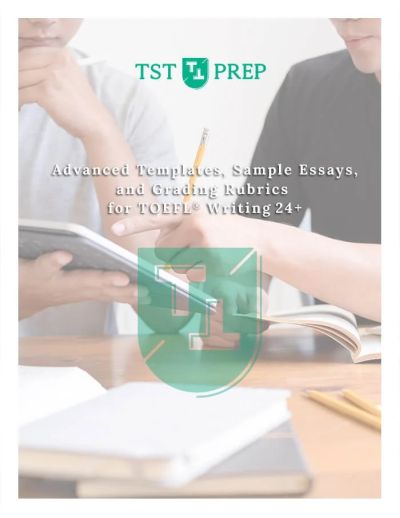
Writing for an Academic Discussion Question
You will have 10 minutes to complete the Writing for an Academic Discussion question .
For this task, you will participate in an online discussion. After you read the question and student responses, you will have to write a response that adds to the conversation.
Here’s the breakdown:
This question is straightforward, but let’s do a sample together.
When the question appears on the screen, take two minutes to scan the passage and the student’s opinions.

Start to write your response. Be sure to add to the discussion and avoid repeating the same points as the other students.
Aim to write at least 120 words.
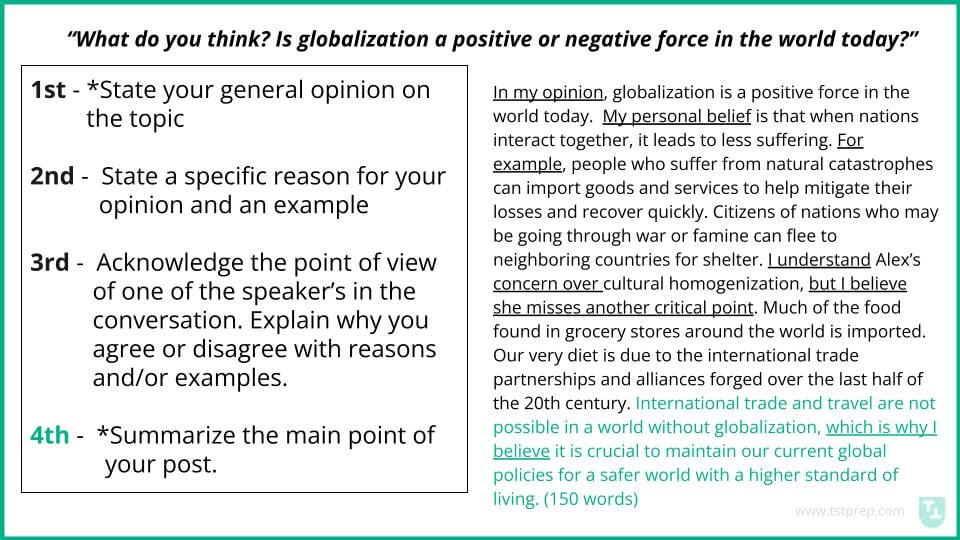
Get peace of mind with these TOEFL Writing Templates
Now that you have a few TOEFL Writing topics and sample essays to study from, you may want to use a writing template to help guide your writing.
A TOEFL template is basically a pre-organized set of words and phrases that you can use in almost any TOEFL Writing response.
Here’s TST Prep’s template for the integrated TOEFL Writing question (question one):
And here’s our template for the independent TOEFL Writing for an Academic Discussion (question two):
The article introduces the topic of (general topic) . More specifically, the writer discusses (stance of the author on the topic) . The lecturer in the listening passage disagrees. He believes that (stance of the professor on the topic) and attacks each of the claims made in the reading.
In the reading, the author begins by stating that (first point made to support stance) . The lecturer, however, disagrees. He states that (first counterargument by the professor) . He goes on to say that (additional detail about first counterargument) .
The author also claims that (second point made to support stance) . Again, the lecturer believes there are flaws in the writer’s argument. The speaker holds that (two sentences about the professor’s second counter-argument) .
Another reason why the author feels that (restate stance of author) is that (third point made to support stance) . The professor in the listening passage is doubtful that this is accurate. He suggests that (two sentences about the professor’s third counter argument) .
To sum up, both the writer and professor hold conflicting views about (general topic) . It’s clear that they will have trouble finding common ground on this issue.
You will notice that the sample essays in this article differ from the templates.
You do not have to use templates, it’s up to you. Some people prefer to write in their own unique fashion for the entire exam. However, you will notice that the structure of the templates is similar to the TOEFL example essays.
These templates follow the exact organization and structure you are expected to use on test day, so don’t hesitate to use them in your writing.
Also, don’t forget to download the free 24+ TOEFL Writing Guide if you would like more example essays, templates, and exclusive tips to help you earn the best possible TOEFL Writing score on test day.
If you read this far, it means you are serious about your TOEFL studies. Don’t hesitate to send us an email and let us know how we can help you earn the TOEFL score of your dreams – [email protected]
Did we forget anything? Please comment and let us know how we can improve our TOEFL Writing advice (or if you want to just say hi that would be great too).
113 Comments
Hello, Josh. Firstly, thanks for the useful tips. I wonder if I can get a point if I don’t understand the lecture but write everything about reading. Should every idea in the passage and audio be matched?
Hi Ella, Thanks for your question. In general, the listening points should correspond with the reading. This is because the listening usually argues the opposite points.
Hi, Josh. I have a question about copying and pasting in TOEFL writing. I heard some TOEFL teachers say it should be avoided because ETS will consider it a potential form of plagiarism in future academic study.
Could you please provide some suggestions in terms of this issue? Is it ok to copy and paste, since it saves a lot of time in writing, especially on the test day. Thank you!
Great question. The copy-and-paste feature will not work at the test center, and I do not believe it works on the Home Edition either. Regardless, copying and pasting or manually copying the exact words should be avoided. You are always better off putting the answer into your own words.
Abdul Siyar Azizi
Hello Josh, I have a question regarding how we can write an advanced writing that will be scored 25+?
Thanks very much for your question. We do have some templates that can help to increase your score. However, to give you a more detailed answer, I would suggest you consider doing an essay evaluation with us so we can help you determine specific areas for improvement. In the meantime, here are some articles that can help.
https://tstprep.com/articles/toefl/ten-awesome-tips-for-the-writing-section-of-the-toefl-test/
https://tstprep.com/articles/toefl/sample-essays-for-the-writing-section-of-the-toefl-test/
Hi Josh! For the academic writing, I only gave my reason for the topic, and I forgot to mention the opinion of the other student. I checked my word count. It is already past 100 words, and I do not want it to be too long. Do we really need to mention the other students’ opinion?
Hi Ireen. Great question! We often suggest mentioning one of the other students, but it is not required. As long as what you said was on topic, you “added to the discussion,” and gave specific reasons and examples, you should be okay with the 100 words you wrote.
Hello, I have a question about the independent writing: Is it a problem if I just give one reason in my essay (but detailed enough)? Thank you
Hi there and thank you for your question. There are no specific grading criteria that say you MUST give two reasons for your opinion, so, in theory, yes, you can just give one reason. I don’t think you will be marked down for it. If possible, try to give two though. It will make your word count higher.
Leave a Reply Cancel reply
Your email address will not be published. Required fields are marked *
This site uses Akismet to reduce spam. Learn how your comment data is processed .

Take the TOEFL® Test at Home During the Coronavirus (updated August 2021)

The Ultimate Vocabulary List for the TOEFL® Test

Ten Awesome Tips for the Speaking Section of the TOEFL®

The TOEFL Essentials® Test: 8 Things You Need to Know
Create a FREE Practice Account
Join now and start learning with our free materials

- Privacy Overview
- Strictly Necessary Cookies
- 3rd Party Cookies
This website uses cookies so that we can provide you with the best user experience possible. Cookie information is stored in your browser and performs functions such as recognising you when you return to our website and helping our team to understand which sections of the website you find most interesting and useful.
Strictly Necessary Cookie should be enabled at all times so that we can save your preferences for cookie settings.
If you disable this cookie, we will not be able to save your preferences. This means that every time you visit this website you will need to enable or disable cookies again.
This website uses Google Analytics to collect anonymous information such as the number of visitors to the site, and the most popular pages.
Keeping this cookie enabled helps us to improve our website.
Please enable Strictly Necessary Cookies first so that we can save your preferences!
TOEFL iBT ®
The premier test of academic English communication
TOEFL iBT Test Writing Section
The TOEFL iBT test Writing section measures your ability to write in English in an academic setting, and to present your ideas in a clear, well-organized way.
There are two writing tasks.
- Integrated writing task (20 minutes) — read a short passage and listen to a short lecture, then write in response to what you read and listened to.
- Writing for an Academic Discussion task (10 minutes) — state and support an opinion in an online classroom discussion.
You'll type your responses on a computer keyboard.
Test time: It should take about 29 minutes to complete the Writing section.
Scoring: Writing tasks are scored based on the Writing Scoring Guides (Rubrics) (PDF) by a combination of AI scoring and certified human raters. Raw scores are converted to a scaled section score of 0–30.
Practice Your Writing Skills
Explore a variety of official prep offerings to practice your English-writing skills with TOEFL ® TestReady ™ . Get insights and feedback on your grammar, usage, mechanics and more.
Writing videos
Watch these videos to learn about the questions in the Writing section, plus helpful tips.
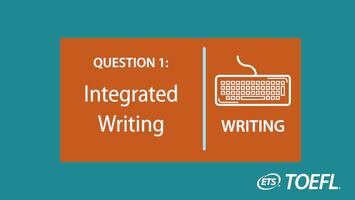
Question 1: Integrated Writing
Read a passage and listen to a lecture. Then write a response comparing them.
View Transcript
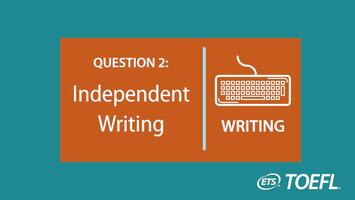
Question 2: Writing for an Academic Discussion
Share your opinion in an online discussion with a professor and other students.
Do you need to be an expert on the topics?
The writing tasks measure your English proficiency, so you don't need deep knowledge on a specific topic to get a high score. Score raters recognize that each essay is a first draft, and you can receive a high score with an essay that contains some errors.
Test Resources
TOEFL® Resources by Michael Goodine
Toefl independent writing master guide (2023 update).
Here’s how the TOEFL Independent writing question works:
- It is the second writing question on the TOEFL Test
- You will be asked a question about your personal opinion and be given 30 minutes to write about it.
- Questions can be about any topics, but they are most often about education, work and society in general.
- There is no minimum or maximum word count, but I think you should write between 380 and 400 words.
Styles of Questions
There are four main styles of TOEFL independent essay questions in 2022. They look like this:
Agree/Disagree Style (most common)
Do you agree or disagree with the following statement? Children should be required to follow strict rules set by their parents . Use specific reasons and examples to support your answer. Do not use memorized examples.
Do you agree or disagree with the following statement? Students do not respect their teachers as much as they did in the past . Use specific reasons and examples to support your answer. Do not use memorized examples.
Multiple Choice Style (common)
Which of the following values do you think is best to teach to a young child? being honest being helpful being patient Use specific reasons and examples to support your answer. Do not use memorized examples.
Preference Style (common)
There are many different styles of classes at schools nowadays. Some students prefer classes where they interact with their teacher and other students. Others prefer classes where they just listen to their teacher speak. Which do you prefer? Use specific reasons and examples to support your answer. Make sure to use your own words. Do not use memorized examples.
Imaginary Situation (less common)
Imagine a situation where you have a school assignment and are unable to finish it before the deadline given by your teacher. What do you think is the best thing to do in this case – submit an incomplete assignment, or wait until it is completely finished and submit it after the deadline. Use specific reasons and examples to support your answer. Do not use memorized examples.
Note that questions are somewhat longer than in the past.
Coming up with Ideas
I get a lot of questions about how to come up with ideas about what to write. To deal with this problem, check out my video .
How to Structure the Essay (Template)
To show you how to write the essay, I will use this question:
Do you agree or disagree with the following statement? Students do not respect their teachers as much as they did in the past . Use specific reasons and examples to support your answer.
Writing an Introduction
The first part of your TOEFL independent essay is the introductory paragraph. You could follow this template:
- Sentence One: The “Background Information” This is an interesting sentence that introduces the general theme or topic of the essay. I recommend stating something that most people agree we should do : “ Most people agree that everyone in the world should… “
- Sentence Two: The Main P oint This is your main argument and direct answer to the question. Start with “ Personally, I believe that… “
- Sentence Three: The T ransition Just use: “ I feel this way for two reasons, which I will explore in the following essay .”
For the above question, the introduction could look something like this:
Most people in the world agree that everyone should get as much education as possible. Personally, I believe that young people do not have as much respect for their teachers as in the past. I feel this way for two reasons, which I will explore in the following essay .
There are a few things to keep in mind as you write your introduction:
- Don’t waste time on the opening line. It isn’t very important.
- Don’t copy and paste from the prompt.
- Write about 50 words .
Writing Body Paragraphs
Next you must write two body paragraphs that support your thesis. You could dse this template for your first body paragraph:
- Sentence One: A Topic Sentence This summarizes your first supporting reason. Begin with “ To begin with… “.
- Sentences Two and Three : The Explanation Explain what you mean, without talking directly about a personal experience.
- Sentence Four: The Transition Just use: “ My personal experience is a compelling illustration of this. “
- Sentence Six to End: The Personal Example An example from your life that illustrates this argument. It should make up about 60% of the body paragraph.
This leads to a paragraph like this:
To begin with , there are many more ways for students to learn nowadays, which means they are less reliant on teachers than in the past. A few years ago, children could only acquire new skills by going to school and attending classes , so they respected their teachers a lot. In contrast , now they can easily use technology to learn independently. My personal experience is a compelling illustration of this . For the past five years, I have studied English almost every single day. Although my native language is Korean, I am able to easily communicate in English without feeling any anxiety. I expand my vocabulary by using a smartphone application that teaches me new phrases twice per day, and I practice pronunciation by watching videos on the Internet. Consequently , I feel like old-fashioned classes with a teacher are not as important as they used to be. If I had tried to become proficient in English twenty years ago, I would have depended on a teacher and respected her a lot.
Use a similar template for your second body paragraph:
- Sentence One: A Topic Sentence This summarizes your second supporting reason. Begin with “ Furthermore… “.
- Sentences Two and Three : The Explanation Explain what you mean, without talking directly about personal experience.
- Sentence Four: The Transition Just use: “ For instance, “
- Sentences Five to End: The Personal Example An example from your life that illustrates this argument. Again, it should be about 60% of the paragraph.
That would result in a paragraph looking something like this:
Furthermore , teachers are no longer strict, which means children don’t fear them at all. If teachers fail to discipline students when they misbehave, they do not feel obligated to respect them. This problem is very common nowadays. For instance, a few months ago my little brother used profanity when addressing his math teacher. Surprisingly, he wasn’t punished for this terrible behavior. His teacher was afraid of how our parents would react to my brother being punished, so he just ignored it. Since then , my brother hasn’t respected that teacher at all , and is often quite rude. In addition , a lot of his classmates have picked up on the fact that they can get away with impolite behavior and have started acting up as well. Based on this experience , I strongly feel that young people do not respect educators like they did in the past.
There are a few things to keep in mind as you write the body paragraphs:
- Use a mix of simple, compound and complex sentences. This is mentioned as “syntactic variety” in the scoring rubric.
- Emphasize the examples. They are easy to write, so they should make up about 60% (or more) of each body paragraph. If you emphasize them, you will make fewer mistakes.
- Avoid very short sentences (less than seven words) and very long sentences (more than 60 words).
- Don’t start sentences with coordinating conjunctions. The e-rater seems to dislike this.
- Use a variety of discourse phrases (therefore, moreover, as a result, in addition, etc).
- Write about 150 words in each body paragraph.
Writing a Conclusion
Conclusions are easy. You just need to repeat your thesis and your two supporting arguments. Try this short template:
- Sentence One: Restate the Thesis Paraphrase your thesis. Begin with “ In conclusion, I strongly feel that… “.
- Sentence Two: Restate the Two Reasons Just use: “ This is because ______, and _______. “
That will produce something that looks like this:
In conclusion, I strongly feel that children do not respect their teachers as much as they used to. This is because teachers are not as essential as they were a few decades ago , and they are too nervous to enforce rules .
Here’s what you should keep in mind:
- Paraphrase yourself. Don’t copy and paste from either the thesis or the topic sentences when you write the conclusion.
- Don’t introduce new arguments in the conclusion
- Write about 40 words in the conclusion
Final Thoughts
That’s how you write a strong TOEFL independent essay. There are a final few points that are worth mentioning here, of course:
- There is no word limit. You can write as much as you want.
- In multiple choice questions you can totally ignore the choices you don’t pick.
- The template works for all of the styles
- Practice does not make perfect. Proper practice makes perfect. For help, sign up for my evaluation program .
- You will not get punished for using a simple template.

Further Reading
We maintain a large collection of complete sample essays , written using the above techniques.
You may wish to continue by reading our guide to the integrated essay .
Sign up for express essay evaluation today!
Submit your practice essays for evaluation by the author of this website. Get feedback on grammar, structure, vocabulary and more. Learn how to score better on the TOEFL. Feedback in 48 hours.
Sign Up Today
9 Engaging TOEFL Writing Samples to Hone Your Skills
Struggling to weave words that score high on the TOEFL writing section? You’re not alone.
This concise guide laces your preparation with TOEFL writing samples —your key to unlocking eloquence and precision in your test responses.
Excel in crafting essays that resonate with evaluators, using these exemplary models.
1. Capturing the TOEFL Integrated Writing Essence
2. excelling at independent toefl essay writing, 3. where to uncover more toefl writing examples, 4. analyzing toefl writing samples: a review strategy, 5. templates: simplifying the toefl writing process, 6. tips and tricks from toefl writing veterans, 7. mastering toefl integrated writing topics, 8. tackling the toefl independent writing challenges, 9. practicing your writing skills with sample prompts, toefl writing guidelines and evaluation criteria, leveraging writing samples beyond the toefl, conclusion: fine-tuning your toefl writing mastery.
When approaching the intriguing challenge of the TOEFL Integrated Writing task, the essence lies in harmonizing diverse sources of information into one cogent piece. Here’s a closer look at a top-scoring TOEFL writing sample:
- Synchronization of Ideas: The sample excels at integrating concepts from the reading and listening passages. It doesn’t just summarize the points but rather compares, contrasts, and connects them thoughtfully.
- Language Precision: Linguistic accuracy is pivotal. Notice how the writing uses complex sentence structures without compromising clarity.
- Cohesion and Coherence: Seamless transitions maintain the argument’s flow. The use of conjunctions and transitional phrases like “ however ” is artful, ensuring that each paragraph smoothly leads to the next.
By examining this top-scoring example , you can better understand how to create a composite narrative that stands up to stringent assessment.
Shifting gears to the Independent Writing task, this is your chance to shine – your argument, your structure, your voice. A high-scoring independent writing sample charts a path for success:
- Strong Introduction: It opens with a clear thesis statement that sets a compelling direction.
- Logical Development: Each paragraph presents a distinct but connected idea, reinforcing the central argument.
- Rich Examples: Concrete examples ensure your arguments resound with credibility and weight.
- Stylistic Fluency: The sample radiates linguistic finesse, sporting a range of vocabulary without appearing forced.
An effective strategy is to dissect writing samples that have aced the test. Analyze their structure and the techniques they employ in articulating persuasively held viewpoints.
Variety is the spice of language learning, and you’ll find a plethora of TOEFL writing samples online. Sources that could enrich your preparation include:
- Official Test Prep: A treasure trove of authentic material can be found on official TOEFL prep sites, ensuring you’re practicing with examples that accurately reflect the exam standards.
- Educational Platforms: Websites specializing in standardized test preparation often publish high-quality, evaluated samples accompanied by insightful analysis.
Embark on a quest to uncover more writing examples to help you master the art of writing essays that resonate with the TOEFL’s evaluation criteria.
Harness the power of reflection to elevate your writing. As you review TOEFL writing samples, employ strategies that seasoned language educators recommend:
- Organization Scrutiny: Examine how sample essays are structured, and identify the scaffolding of strong introductions, supporting paragraphs, and conclusive endings.
- Contrast and Compare: Zero in on the usage of contrast words, like “ however ,” which signify the writer’s ability to weave nuanced discussions.
- Grammar and Syntax: Pay particular attention to grammatical precision. Sample essays often illustrate complex entities like compound sentences that lead to higher language proficiency without sacrificing accuracy.
Delving into the intricacies of samples will arm you with the know-how to replicate success elements in your own writing endeavors.
Templates: they’re like blueprints for your TOEFL essays, providing a clear outline to follow for both integrated and independent tasks. Consider utilizing templates to:
- Structure your response: Following a template ensures all necessary components are present, making your essay complete and coherent.
- Streamline your writing: With a blueprint at hand, your focus can remain on expressing your ideas rather than worrying about the essay’s format.
- Gain confidence: Having a go-to structure can bolster your writing confidence, knowing you have a tried-and-tested formula backing you up.
For practical templates that can simplify your writing process, you may find the suggestions on TOEFL Resources particularly helpful.
Every athlete has a coach, and every successful TOEFL candidate has a slew of tactics up their sleeve. Here are some insider tips:
- Effective Note-Taking: Learning the art of jotting down quick, useful notes from passages can be a game-changer for your integrated writing task.
- Transitional Phrasings: Using phrases that bridge thoughts and ideas gives your essay a polished, expert feel, much like threading beads on a string.
- Mindful Time Management: Watching the clock is essential. Allocate your writing and review time efficiently to ensure a finished, well-polished submission.
Gleaning advice from those who’ve achieved high scores will provide a wealth of actionable writing tips and strategies to enhance your own performance.
Crafting a stellar response for the TOEFL Integrated Writing task first begins with a keen understanding of the topics you may encounter. While the topics are wide-ranging and sourced from various academic subjects, the primary goal stays constant: to sieve through the given resources and create a unified, coherent critique.
Typical themes could range from business dynamics to environmental policies, all the way to nuances in artistic movements. Here’s how you can prepare for any curveball:
- Stay Informed: Regularly read up on general knowledge subjects. The more informed you are, the more angles you’ll find to approach the integrated writing task.
- Practice Synthesis: Learn to quickly identify key points from reading and listening sources and integrate them using comparative language.
- Develop Critical Thinking: Go beyond surface-level comprehension. Assess the reading and listening material critically to make compelling arguments.
Understand that TOEFL writing samples serve as archetypes—steep yourself in their strategies, yet always be prepared to apply your own intellect to unique topics.
Indeed, TOEFL Independent Writing offers its unique set of challenges. Your opinion is the helmsman, steering the essay’s direction amidst the turbulent tides of ideas and elaboration. What common pitfalls might you face, and how can you triumphantly bypass them? Consider the following:
- Overly Complex Language: Clarity trumps complexity. It’s tempting to use sophisticated language, but if it muddles the clarity of your argument, it’s counterproductive.
- Insufficient Support: An opinion isn’t enough; your statements must be substantiated with relevant examples and explanations.
- Wavering Off-Topic: Remain vigilant in ensuring your essay stays tightly aligned with the assigned topic, resisting the drift into irrelevant tangents.
Nurturing the knack to sidestep these pitfalls comes from immersing yourself in exemplary TOEFL writing that exemplify the balance between complexity and clarity, while anchoring firmly to the topic.
To hone your skills effectively, what could be better than diving headfirst into practice? Find solace in the plethora of TOEFL writing samples and prompts available:
- Brainstorm and Outline: Before free-writing, take a moment to brainstorm and create a structured outline for each prompt.
- Timed Writing Sessions: Simulate test conditions by timing yourself, which will also aid in managing exam anxiety.
- Peer Review: Swap essays with fellow TOEFL hopefuls or use online forums. Fresh eyes on your work can provide valuable feedback.
Equip yourself with a plethora of TOEFL Independent Writing topics to kickstart your focused writing practice sessions.
Grasping the TOEFL writing samples is one part of the journey—understanding how they are evaluated is another mile to tread. What exactly are evaluators looking for in your essay to deem it as high-scoring?
- Focused and Coherent Responses: Your writing should signify clear, purposeful leadership toward a central idea.
- Language Usage : Mastery of English language conventions is vital—the more control you have over your linguistic tools, the finer the craftsmanship of your essay.
- Development and Support : Adequate examples and clear reasoning solidify your arguments, indicating depth in your understanding and expression.
Plunge deeper into the specifics of what makes a TOEFL essay transcend average quality; study the official scoring rubrics thoroughly to see through the lens of an evaluator.
The mastery achieved through dissecting TOEFL writing samples can transcend test day; you’re essentially honing a lifelong skill set. The clarity, coherence, and persuasiveness you labor over for your TOEFL essay are not merely for exam halls:
- Academic Endeavors: Essays, research papers, and dissertations will demand the same structured thought and command over language.
- Professional Aspirations: In the workplace, you’ll find that the ability to clearly articulate information is invaluable, from emails to reports to presentations.
Embrace the practice with TOEFL writing samples as a foundational exercise that fortifies your general English writing proficiency , carving a path of eloquence in both academic and professional landscapes.
Refining your TOEFL writing skills is an ongoing process—a harmonious blend of studying exemplary TOEFL writing samples and diligently practicing what you acquire from each analysis. Imprint upon your mind the ethos that each writing task is not only a testament to your English language abilities but also a stepping stone to greater academic and professional writing prowess.
Revisit the templates, prod the prompts, scrutinize the samples and, most importantly, acquaint yourself with the intricate tapestry of evaluation criteria. With each paragraph you compose, remember that you are knitting together strands of skills that will extend far beyond the TOEFL exam.
Finesse in TOEFL writing is a quiet herald of victories to come, both on your score reports and in the many chapters of your educational and career ambitions that lie ahead.
Toefl writing samples explored: Enhance your test preparation with our collection of model essays and effective writing strategies.

TOEFL Prep Online Guides and Tips
How to ace the toefl writing section: 7 expert tips.
Want to know all the information you need to write two great essays and ace the TOEFL Writing section?
This guide has all the tips you need to do well on TOEFL Writing. We’ll explain exactly what you can expect to see in this section, then give TOEFL Writing tips tips on how to answer both essay types, how you should study, and what you should do on test day to make sure you ace this section.
Overview of the TOEFL Writing Section
The TOEFL Writing section lasts 50 minutes and contains two tasks: Integrated Writing and Independent Writing. It’s the final section of the TOEFL. After this, you’re done!
You’ll have 20 minutes to plan and write the Integrated Writing Task and 30 minutes to plan and write the Independent Writing Tasks. Both essays will be written on the computer. We’ll discuss the tasks and what you’re expected to write in more detail in the next section.
After you complete the exam, your essays will be graded by several (typically four) graders. Each essay will receive a score from 0-5. The sum of those two scores will then be scaled to a score from 0-30, which is your official Writing score. The Writing section makes of 25% of your total TOEFL score (from 0-120).
What Types of Questions Are on TOEFL Writing?
The Writing section contains two tasks. In this section, we’ll explain the format and content of the tasks and give an official example question and response tips for each question type.
By the way: we have built the world's best online TOEFL course . Get online practice (TPO-sytle!) and individual grading and feedback on Speaking and Writing.
Learn how you can improve your TOEFL score by 15 points today .
TOEFL Integrated Writing
The TOEFL Integrated Writing task requires you to use listening, reading, and writing skills. For this task, you will have three minutes to read a short passage, then you will listen to a short (approximately two-minute long) audio clip of a speaker discussing the same topic the written passage covers. You will have 20 minutes to plan and write a response that references both of these sources. You won’t discuss your own opinion.
During the writing time, you’ll be able to look at the written passage again, but you won’t be able to re-hear the audio clip. You’ll be able to take notes while you listen to it though. The suggested response length for this task is 150-225 words. You’ll be graded on the quality of your writing as well as how well your response represents the main points of the audio clip and written passage and how they relate to each other.
Sample TOEFL Integrated Writing Question
(On the real TOEFL, the lecture would be an audio clip instead of a transcript.)
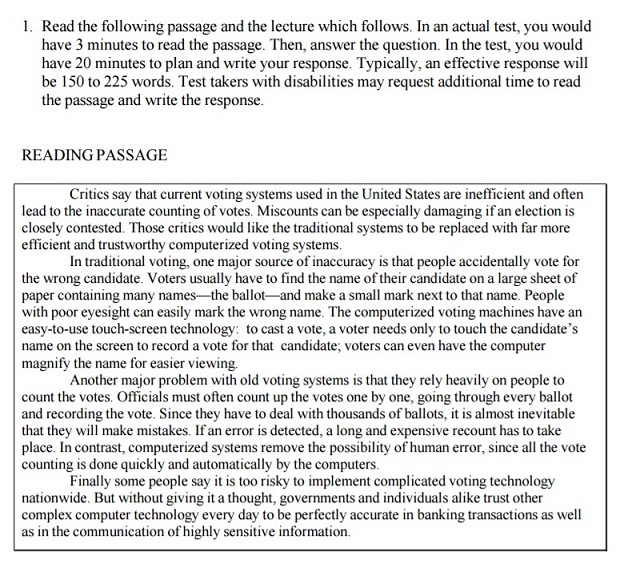
TOEFL Writing Tips for Answering
- Frequently refer back to the audio clip and written passage when making an argument. A key part of your grade is how well you show you understood the information these two pieces contained.
- However, don’t just copy portions of the audio clip or passage into your essay; that doesn’t show your English skills. Always rewrite the main ideas in your own words.
- When answering this question, pay careful attention to any differences between the information in written passage and the information in the audio clip. These differences are often an important part of your response.
- Take good notes when the audio clip is playing. You won’t have an opportunity to listen to it again.
- Don’t inject your own opinion. Only discuss what the audio clip and passage are saying. You’ll only discuss your own opinion on the Independent Writing Task.

TOEFL Independent Writing
For the Independent Writing task, you’ll receive a question on a particular topic or issue. You’ll have 30 minutes to plan and write a response to that topic that explains your opinion on it. You’ll need to give reasons that support your decision.
It’s recommended that your response to this task be at least 300 words, and you’ll be graded on how well you develop your ideas, how well your essay is organized, and how accurately you use English to express your ideas.
Sample TOEFL Independent Writing Question
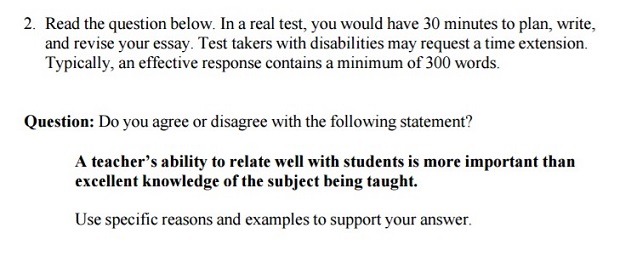
- Don’t be afraid to make things up. This essay is all about creating a strong argument for your opinion on a topic. If you don’t really care about the topic you’re supposed to write about, choose whichever side you can write a stronger essay for, and act like that’s your opinion.
- Make your opinion clear within the first paragraph of your essay. There should be no doubt as to how you feel about the topic.
- Longer isn’t always better. The minimum recommended length for this essay is 300 words. If you have spare time and points you still want to make, keep writing, but don’t feel like your essay needs to be 600 words. Aim for your essay to be at least 300 words, but if it’s only, say, 320 words, it’s still possible for it to get a top score if you’ve written it well.
TOEFL Writing Study Strategies
You should absolutely study the TOEFL Writing section and do practice essays before exam day. Below are some tips to help you get the most out of your studying.
Study Strategy 1: Study the 2 Essay Types
The two essays you need to write for this section are more different than they may appear at first glance, and it’s important to be aware of those differences to understand how to get top scores for both essays.
For the Integrated essay, you should not give your own opinion on the topic, and you’ll need to refer to specific points in the audio and written passages to back up your claims. For the Independent essay, you will have to give your own opinion, along with specifics to back it up.
Completing practice essays will help you become more familiar with what the prompts will look like (see next section), and you should also look at the rubrics TOEFL graders will use when grading your essays so you get a better understanding of what you need for a high score.
Study Strategy 2: Take TOEFL Writing Practice Essays
Any writing you do in English can help strengthen your skills and help you do better on TOEFL Writing, but it’s especially important to take practice TOEFL essays. Completing practice essays will help you become more familiar with the different essay prompts, strengthen your writing skills, and learn how to manage your time when writing essays.
We have a guide to all the best TOEFL Writing practice resources, including numerous free and official practice essays. Check it out to get some great study materials for the Writing section.
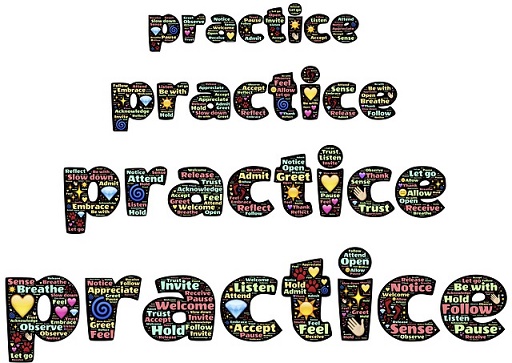
Study Strategy 3: Time Yourself When Writing Practice Essays
When you’re doing practice essays, you should also be sure to time yourself. Give yourself 20 minutes to plan and write an Integrated Writing essay and 30 minutes to write an Independent Writing essay.
Timing yourself when you write will help you be more prepared for test day since you’ll get practice planning and writing essays within a limited time frame. When you first start writing your practice essays, it can be easy to spend too much time preparing which will cause you to run out of time before you finish writing. Completing timed practice essays will help you avoid this.
You should also count how many words your essays contain after you’ve finished writing them. Integrated Tasks should be 150-225 words and Independent Tasks should be at least 300 words.
Study Strategy 4: Review Your TOEFL Writing Practice Essays
After you write each practice essay, you should also review it and think about how well it answered the question. This is easier to do if the practice question comes with sample answers that you can compare your answer to, but you should do this step for all practice essays you write, even if they don’t come with any answer explanation. You can also assign your essays a score or have a tutor or friend who’s also studying for the TOEFL score your essay.
It’s tempting to take a break from TOEFL studying as soon as you’ve finished your essays, but it’s important to do this step because it will get you thinking about what great essays look like and how yours can be improved.
TOEFL Writing Tips for Acing the Section on Test Day
The last step in acing TOEFL Writing is having a great exam day. Follow these TOEFL writing tips to help ensure everything goes smoothly while you’re completing the Writing section.
Test Tip 1: Take a Few Minutes to Plan Your Essays
Since you only have a limited amount of time to complete your essays, it can be tempting to start writing the second your time starts. You want to avoid doing this, however. Spending just a few minutes planning your essay can help keep your writing focused and on topic, and it can often help you write faster because you know what you’ll be discussing next.
Spend a max of two to three minutes writing a basic outline for your essay. It should include:
- Your thesis statement (the main point you’re making and will discuss throughout the essay)
- The main point of each paragraph you’ll have in your essay
- Any specific examples you can quickly think of (either from the included passages or your own opinion, depending on the essay) to back up your claim
Before you begin writing, reread the essay prompt again to make sure your outline answers the question well (see next section for more details).
Test Tip 2: Keep Referring Back to the Question
Even if you craft a beautiful essay with perfect English, you won’t get a good score if you don’t answer the question properly. It can be easy to go off on a tangent or begin to discuss something other than what the question is asking.
For example, the Independent Writing sample question above asks you to explain whether it’s more important for teachers to relate well to students or have excellent knowledge of the subject they’re teaching. In your essay, you might include an example of a great teacher you had and spent the majority of the essay explaining why that teacher was your favorite. Even if your writing is flawless, you wouldn’t get a good score because you’re not discussing the question the essay prompt is asking.
This is something practice and making an outline before you begin writing can help you avoid, so be sure to do both, and remember to reread the prompt as you write your essay to make sure you’re on track.

Test Tip 3: Leave Some Time to Review Your Essays
After you’ve finished writing your essay, it’s helpful if you can spend a little bit of time looking it over. Even setting aside 60 seconds can give you enough time for you skim your essay and catch and spelling or grammar errors or any sentences that aren’t clear. F ixing these little mistakes can help you from losing points when your essays are scored. Doing practice essays will help you get better at managing your time so it’ll become easier to finish your essays with some time to spare for reviewing.
Acing TOEFL Writing: What You Need to Know
In order to do well on the TOEFL Writing section, it’s important to first learn exactly what types of essays you’ll be expected to write, what they should include, and how you’ll be graded on them. While you’re studying for this section, be sure to study the two essay types, take practice essays, time yourself when writing essays, and review your practice essays.
On exam day, during the Writing section you should outline your essays before you begin writing, refer back to the essay prompts regularly, and leave yourself a bit of time at the end to review what you’ve written. Keep these TOEFL Writing tips in mind, and you’ll be well on your way to writing great essays. And remember, this is the last section of the TOEFL. Once you finish the Writing section, you’re done!
What’s Next?
Not sure what TOEFL score you should be aiming for? Learn what a good TOEFL score is based on the schools you’re interested in.
Want more tips on how to prepare for TOEFL Writing questions? Check out our guide to the best ways to practice for TOEFL Writing!
Once you’ve taken the TOEFL, how do you send your scores to schools? Learn the six tips you need to know for sending your TOEFL Scores.
Ready to improve your TOEFL score by 15 points?
Author: Christine Sarikas
Christine graduated from Michigan State University with degrees in Environmental Biology and Geography and received her Master's from Duke University. In high school she scored in the 99th percentile on the SAT and was named a National Merit Finalist. She has taught English and biology in several countries. View all posts by Christine Sarikas
Comments are closed.

IMAGES
VIDEO
COMMENTS
Below is an official TOEFL Integrated Writing sample question and as well as an essay response that received a score of 5. It includes a written passage, the transcript of a conversation (which would be an audio recording on the actual TOEFL, and the essay prompt. After the prompt is an example of a top-scoring essay.
The first TOEFL writing question is the Integrated Writing Task. You will first read an article, then listen to a lecture, and finally write an essay using details from both. Your essay should be about 280 words. You will have 20 minutes to write. Below are some practice questions you can use to get ready for the test.
Directions: Give yourself 20 minutes to plan and write your response. Your response is judged on the quality of the writing and on how well it presents the points in the lecture and their relationship to the reading passage. Typically, an effective response will be 150 to 225 words.
Here's an expert TOEFL teacher's sample essay to this particular TOEFL Writing topic. The article introduces the topic of corn-based ethanol. More specifically, the writer discusses the advantages of switching from fossil fuels to this alternative energy source. The lecturer in the listening passage disagrees.
TOEFL Writing Introduction. The writing section is the fourth section of the TOEFL iBT test and takes about 50 minutes to complete. It consists of two separate tasks: an Integrated Writing task and an Academic Discussion Writing task.The Independent task requires you to write an opinionated essay based on your own knowledge and experience, whereas the Integrated task requires you to write a ...
The TOEFL iBT test Writing section measures your ability to write in English in an academic setting, and to present your ideas in a clear, well-organized way. There are two writing tasks. Integrated writing task (20 minutes) — read a short passage and listen to a short lecture, then write in response to what you read and listened to.
Your TOEFL integrated essay should be about 280 to 300 words. To see this template in use, check out my collection of sample essays. Writing for Academic Discussion (Writing Question Two) Here's a really straightforward template that is easy to use. While some people might think [opposite of my opinion], I really believe that [my opinion]
Complete templates and guide to mastering the TOEFL Independent Essay. Contains new question styles and templates updated for 2023, sample essays and grammar advice. ... It is the second writing question on the TOEFL Test You will be asked a question about your personal opinion and be given 30 minutes to write about it. Questions can be about ...
Develop Critical Thinking: Go beyond surface-level comprehension. Assess the reading and listening material critically to make compelling arguments. Understand that TOEFL writing samples serve as archetypes—steep yourself in their strategies, yet always be prepared to apply your own intellect to unique topics. 8.
After you complete the exam, your essays will be graded by several (typically four) graders. Each essay will receive a score from 0-5. The sum of those two scores will then be scaled to a score from 0-30, which is your official Writing score. The Writing section makes of 25% of your total TOEFL score (from 0-120).